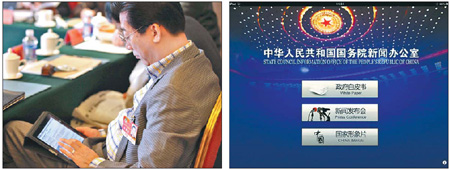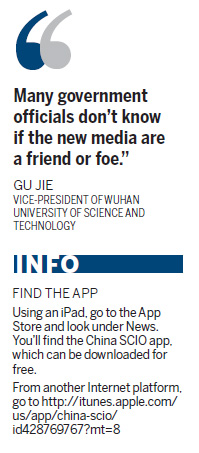Society
App gives Net users a unique insight
By Duan Yan (China Daily)
Updated: 2011-04-18 08:21
 |
Large Medium Small |
Friend or foe?
Teachers who train officials also see room for improvement in government officials' attitudes toward the Internet. In May 2010, about 70 percent of the people polled by People's Tribune, a biweekly magazine under the official People's Daily, said they believed government officials feared public opinion and scrutiny online. The magazine surveyed 5,943 online users and 300 officials.
"Many government officials don't know if the new media are a friend or foe," said Gu from Wuhan University of Science and Technology. "Unlike traditional media, they are different."
If there is fear among officials, some of it may lie in how new media might be used. Most recently, a lower-level official turned his micro blog into both a confessional and a platform for pointing fingers.
 |
|
Left: Feng Dongming, a member of the Chinese People's Political Consultative Conference, uses an iPad to prepare for a presentation he'll make during a group discussion at the annual two sessions in Beijing in March. Right: The "cover" of the State Council Information Office's app for the iPad. [Photo/China Daily] |

Zhou Wenbin, a clerk with Lixin land resources bureau of Bozhou city in East China's Anhui province, admitted in his posts that he had offered bribes. But he also accused other officials of corruption.
The Hefei Evening News reported that Zhou had sent a 7,000-character complaint letter to discipline authorities at various levels, accusing the bureau leaders he worked under of corruption. He started his online postings on Wednesday when he had not received a reply to his letter.
China this month is beginning a two-month campaign to crack down on what it called illegal publicity activities online, according to a statement issued on Wednesday by the State Council Information Office.
The statement said some companies and individuals had recruited "Internet mercenaries" and other illegal organizations to engage in improper competition against rivals, blackmailing by fabricating and distorting facts, and reaping profits by sensationalizing issues over the Internet.
A popular addition
Meanwhile, many officials are getting more curious and enthusiastic about using new media.
The Party School of the Beijing Committee of the Communist Party of China, offers training to officials on how to use micro blogs. It said on its website that the elective course designed for 40 students has attracted more than 80, who occupy two computer labs. Some students send micro blog messages during the course.
Previously, the school's computer courses were limited to the use of office applications such as Microsoft Word, Excel and PowerPoint.
Gao, the governance academy professor, also encourages his students to start blogs and micro blogs, although many of them do not use their real names to register. However, he estimated more than 3,000 Chinese officials nationally, mostly from the local level, have registered with their real names on micro blog services.
One of his most publicized students, Wu Hao, the former spokesman for Yunnan provincial Committee of the Communist Party of China, started micro-blogging in November 2009. Wu, who is now spokesman for Honghe prefecture of Yunnan province, has more than 600,000 followers.
Wu touched on sensitive social issues, including forced demolitions, in his micro blog, which led to heated discussions online.
"Despite his controversial interaction with netizens," Gao said, "his action of giving the Internet a try is still a laudable act."
| 分享按钮 |